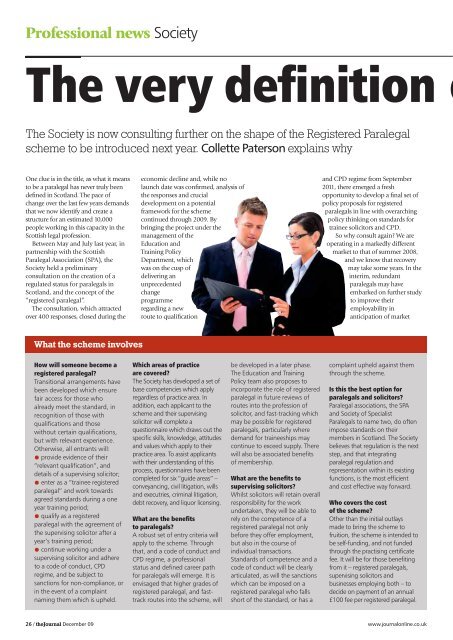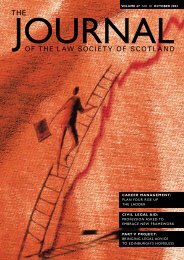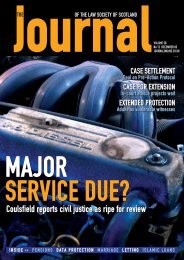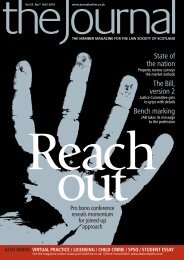Professional briefing - The Journal Online
Professional briefing - The Journal Online
Professional briefing - The Journal Online
Create successful ePaper yourself
Turn your PDF publications into a flip-book with our unique Google optimized e-Paper software.
<strong>Professional</strong> news Society<br />
<strong>The</strong> very definition o<br />
<strong>The</strong> Society is now consulting further on the shape of the Registered Paralegal<br />
scheme to be introduced next year. Collette Paterson explains why<br />
One clue is in the title, as what it means<br />
to be a paralegal has never truly been<br />
defined in Scotland. <strong>The</strong> pace of<br />
change over the last few years demands<br />
that we now identify and create a<br />
structure for an estimated 10,000<br />
people working in this capacity in the<br />
Scottish legal profession.<br />
Between May and July last year, in<br />
partnership with the Scottish<br />
Paralegal Association (SPA), the<br />
Society held a preliminary<br />
consultation on the creation of a<br />
regulated status for paralegals in<br />
Scotland, and the concept of the<br />
“registered paralegal”.<br />
<strong>The</strong> consultation, which attracted<br />
over 400 responses, closed during the<br />
What the scheme involves<br />
How will someone become a<br />
registered paralegal?<br />
Transitional arrangements have<br />
been developed which ensure<br />
fair access for those who<br />
already meet the standard, in<br />
recognition of those with<br />
qualifications and those<br />
without certain qualifications,<br />
but with relevant experience.<br />
Otherwise, all entrants will:<br />
provide evidence of their<br />
“relevant qualification”, and<br />
details of a supervising solicitor;<br />
enter as a “trainee registered<br />
paralegal” and work towards<br />
agreed standards during a one<br />
year training period;<br />
qualify as a registered<br />
paralegal with the agreement of<br />
the supervising solicitor after a<br />
year’s training period;<br />
continue working under a<br />
supervising solicitor and adhere<br />
to a code of conduct, CPD<br />
regime, and be subject to<br />
sanctions for non-compliance, or<br />
in the event of a complaint<br />
naming them which is upheld.<br />
26 / the<strong>Journal</strong> December 09<br />
economic decline and, while no<br />
launch date was confirmed, analysis of<br />
the responses and crucial<br />
development on a potential<br />
framework for the scheme<br />
continued through 2009. By<br />
bringing the project under the<br />
management of the<br />
Education and<br />
Training Policy<br />
Department, which<br />
was on the cusp of<br />
delivering an<br />
unprecedented<br />
change<br />
programme<br />
regarding a new<br />
route to qualification<br />
Which areas of practice<br />
are covered?<br />
<strong>The</strong> Society has developed a set of<br />
base competencies which apply<br />
regardless of practice area. In<br />
addition, each applicant to the<br />
scheme and their supervising<br />
solicitor will complete a<br />
questionnaire which draws out the<br />
specific skills, knowledge, attitudes<br />
and values which apply to their<br />
practice area. To assist applicants<br />
with their understanding of this<br />
process, questionnaires have been<br />
completed for six “guide areas” –<br />
conveyancing, civil litigation, wills<br />
and executries, criminal litigation,<br />
debt recovery, and liquor licensing.<br />
What are the benefits<br />
to paralegals?<br />
A robust set of entry criteria will<br />
apply to the scheme. Through<br />
that, and a code of conduct and<br />
CPD regime, a professional<br />
status and defined career path<br />
for paralegals will emerge. It is<br />
envisaged that higher grades of<br />
registered paralegal, and fasttrack<br />
routes into the scheme, will<br />
be developed in a later phase.<br />
<strong>The</strong> Education and Training<br />
Policy team also proposes to<br />
incorporate the role of registered<br />
paralegal in future reviews of<br />
routes into the profession of<br />
solicitor, and fast-tracking which<br />
may be possible for registered<br />
paralegals, particularly where<br />
demand for traineeships may<br />
continue to exceed supply. <strong>The</strong>re<br />
will also be associated benefits<br />
of membership.<br />
What are the benefits to<br />
supervising solicitors?<br />
Whilst solicitors will retain overall<br />
responsibility for the work<br />
undertaken, they will be able to<br />
rely on the competence of a<br />
registered paralegal not only<br />
before they offer employment,<br />
but also in the course of<br />
individual transactions.<br />
Standards of competence and a<br />
code of conduct will be clearly<br />
articulated, as will the sanctions<br />
which can be imposed on a<br />
registered paralegal who falls<br />
short of the standard, or has a<br />
and CPD regime from September<br />
2011, there emerged a fresh<br />
opportunity to develop a final set of<br />
policy proposals for registered<br />
paralegals in line with overarching<br />
policy thinking on standards for<br />
trainee solicitors and CPD.<br />
So why consult again? We are<br />
operating in a markedly different<br />
market to that of summer 2008,<br />
and we know that recovery<br />
may take some years. In the<br />
interim, redundant<br />
paralegals may have<br />
embarked on further study<br />
to improve their<br />
employability in<br />
anticipation of market<br />
complaint upheld against them<br />
through the scheme.<br />
Is this the best option for<br />
paralegals and solicitors?<br />
Paralegal associations, the SPA<br />
and Society of Specialist<br />
Paralegals to name two, do often<br />
impose standards on their<br />
members in Scotland. <strong>The</strong> Society<br />
believes that regulation is the next<br />
step, and that integrating<br />
paralegal regulation and<br />
representation within its existing<br />
functions, is the most efficient<br />
and cost effective way forward.<br />
Who covers the cost<br />
of the scheme?<br />
Other than the initial outlays<br />
made to bring the scheme to<br />
fruition, the scheme is intended to<br />
be self-funding, and not funded<br />
through the practising certificate<br />
fee. It will be for those benefiting<br />
from it – registered paralegals,<br />
supervising solicitors and<br />
businesses employing both – to<br />
decide on payment of an annual<br />
£100 fee per registered paralegal.<br />
www.journalonline.co.uk










